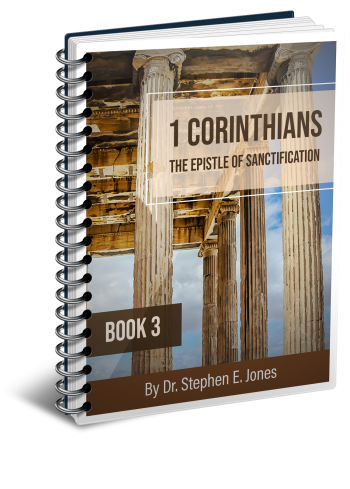Latest Posts
View the latest posts in an easy-to-read list format, with filtering options.

An in-depth commentary/study on chapters 12 and 13 of First Corinthians.
Category - Bible Commentaries

The Hebrew word towb has a range of meaning, but it includes being good, pleasant, agreeable, beneficial, kind, and productive.
Some scholars define it as “functional good.” Al Novak renders it “merry” in his book, Hebrew Honey. In other words, towb is kindness that springs from a merry heart. Paul says it best in 2 Cor. 9:7,
7 Let each one do just as he has purposed in his heart; not grudgingly or under compulsion; for God loves a cheerful [hilaros, “merry, joyful, hilarious, cheerful”] giver.
When Jeremiah speaks of the “good (towb) figs” in Jer. 24:2, he contrasts it to the “bad (ra) figs.” Hence, good figs are kind, while bad figs are unkind. Young's Concordance renders it “useful, beneficial.” This particular metaphor is important because Paul speaks of kindness (chrestotes) as a fruit of the Spirit in Gal. 5:22.
If we pursue this idea further, we find that Jeremiah said that the bad figs were those who refused to submit to Nebuchadnezzar, whom God had raised up to rule over Jerusalem and Judah. They preferred to fight as Judean patriots, ignoring the decree from the divine court. It goes without saying that they had no intention of being “good” or “kind” to the Babylonians but instead treated them as enemies.
Jesus said in Luke 6:35,
35 But love your enemies, and do good, and lend, expecting nothing in return; and your reward will be great, and you will be sons of the Most High; for He Himself is kind [chrestos] to ungrateful and evil men.
So here we have an example of divine kindness, which is an expression of God’s love. He is kind not only to friends but to “enemies” and “to ungrateful and evil men,” and He expects us to have the same character. This is seen also in Paul’s definition of divine love in Rom. 5:6-10, where God died for those who were yet sinners and reconciled those who were still enemies. So Paul says in Titus 3:4-6,
4 But when the kindness [chrestotes] of God our Savior and His love for mankind appeared, 5 He saved us, not on the basis of deeds which we have done in righteousness, but according to His mercy, by the washing of regeneration and renewing by the Holy Spirit, 6 whom He poured out upon us richly through Jesus Christ our Savior.
This kindness was extended while we were yet sinners living a disobedient life style, as the previous verse shows. Thus, when Paul says that love is kind, he was speaking of the quality of kindness seen in the character of God in Christ Jesus. Perhaps it is no coincidence that chrestos and chrestotes are so similar to christos, “anointed” (or Christ).
In 2 Kings 6:8-23 we read how the king of Aram (Syria) sent troops to fight against Israel. The troops tried to set a trap for the king of Israel, but Elisha continued to give godly counsel to the king so that he was able to avoid all ambushes. The king of Syria soon believed that someone in his own camp was a spy, but his servants told him that the prophet Elisha was the problem.
So the king of Syria sent troops to Dothan to take Elisha captive. They surrounded the town at night, and in the morning, Elisha’s servant saw that they were trapped. But Elisha said, “Don’t be afraid. We have more on our side than they.” He then prayed that his servant would be healed of his spiritual blindness and that he might see with his spiritual eyes. When his eyes were opened, the servant saw numerous chariots of fire all around Elisha—and, by extension, around himself as well. No doubt this helped to calm him down a bit.
But once the servant’s eyes were opened, Elisha then prayed that the blindness which had previously afflicted the eyes of his servant would come upon the Syrian troops (2 Kings 6:18). This blindness was not physical, but spiritual. Then Elisha went to the Syrians and told them that they had surrounded the wrong city. “Follow me, and I will bring you to the man whom you seek,” he told them. Elisha then led them to Samaria, where the Israelite army surrounded them.
2 Kings 6:20-23 gives us the conclusion:
20 When they had come into Samaria, that Elisha said, “O Lord, open the eyes of these men, that they may see.” So the Lord opened their eyes, and they saw; and behold, they were in the midst of Samaria. 21 Then the king of Israel, when he saw them, said to Elisha, “My father, shall I kill them? Shall I kill them?” 22 And he answered, “You shall not kill them. Would you kill those you have taken captive with your sword and with your bow? Set bread and water before them, that they may eat and drink and go to their master.” 23 So he prepared a great feast for them; and when they had eaten and drunk, he sent them away, and they went to their master. And the marauding bands of Arameans [Syrians] did not come again into the land of Israel.
This act of kindness toward one’s enemies has no precedent in the eight miracle-signs of Elijah but is found in the sixteen miracle-signs of Elisha—the prophet with the double portion of the anointing. The sixth and seventh miracle-sign of Elijah shows him calling down fire from heaven upon King Ahab’s troops who were sent to capture the prophet (2 Kings 1:10, 12). But when the Syrian king sent troops to capture Elisha, he treated them with kindness.
Inflicting the troops with blindness was the fourteenth miracle-sign of Elisha (2 Kings 6:18), and restoring their sight was his fifteenth miracle-sign (2 Kings 6:20). Blindness could be considered a divine judgment upon His enemies, but restoring their sight shows that the purpose of such judgment was to give God (and Israel) the opportunity to show kindness and mercy. This follows the principle that Paul mentions in Rom. 11:32, 33,
32 For God has shut up all in disobedience, that he might show mercy to all. 33 Oh, the depth of the riches both of the wisdom and knowledge of God! How unsearchable are His judgments and unfathomable His ways!
This suggests that more is required of the Elisha company today than of the Elijah company in the past. With a greater anointing comes a greater responsibility to know and practice the mind of Christ. Whereas believers in the past have tended to use declarations of war as an excuse to exempt them from showing love and kindness to their enemies, the Elisha company has no such exemption.
A double portion of the anointing means that the Elisha company has greater power to deal with God’s enemies than the Elijah company in the past. Destroying one’s enemies in war has certainly been accomplished by the power of God, but when the overcomers receive the double portion (that is, the Birthright of Joseph), they are given greater power, not so that they may destroy more of God’s enemies, but so that they may take those enemies captive alive for the Kingdom of God.
Jesus’ disciples did not understand this principle at first, for when a Samaritan village did not receive them, the disciples asked Jesus if perhaps they ought to call down fire from heaven upon them (Luke 9:54). But Jesus rebuked them, and they passed on to another village. It is clear that the mind of Christ is not to destroy one’s enemies, but to save them.
This mind of Christ is in the overcomers, though not in those who love only their friends and family. Paul wrote in 1 Cor. 13:4 that “love is kind.” The story of Elisha’s kindness toward the Syrian troops is a very good illustration of such kindness.